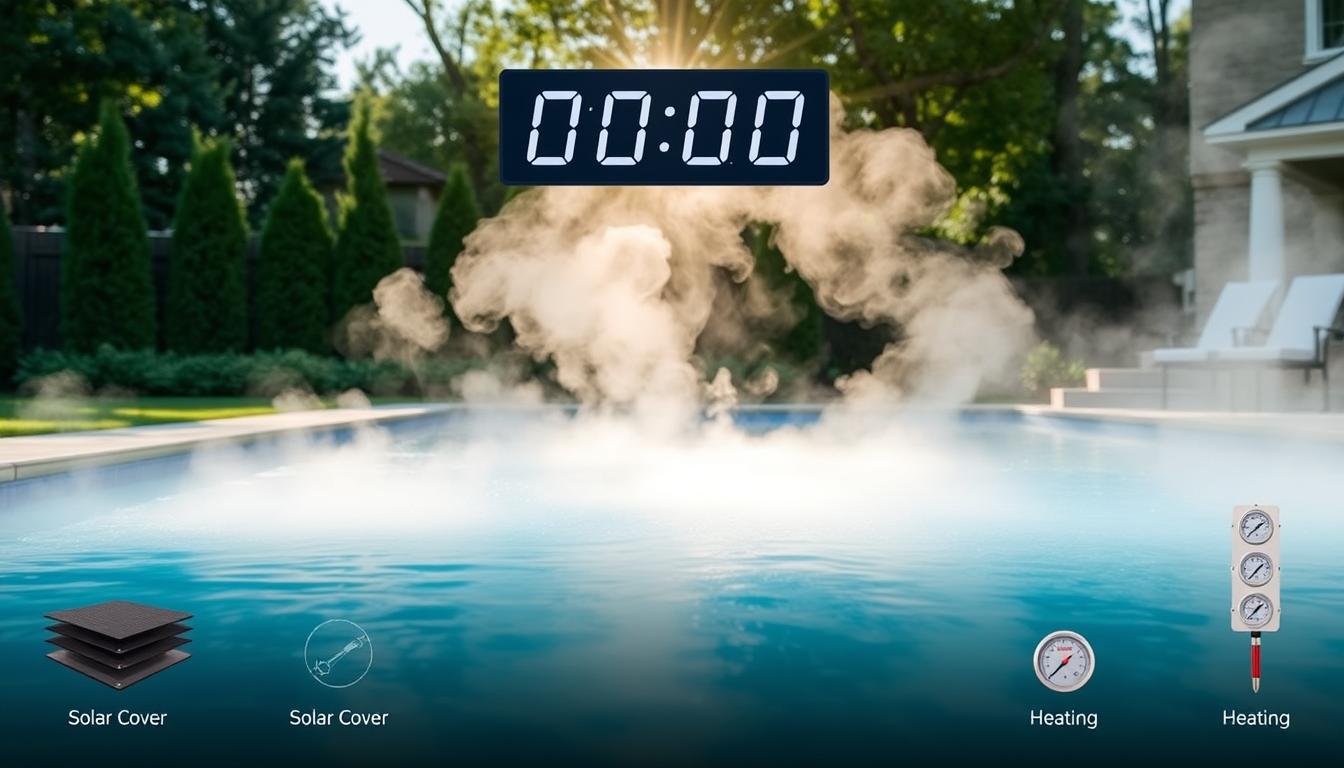
Imagine a perfect summer day, ready for a swim. You approach your pool, but the water feels too cold. Your pool heater can help. But how long will it take to warm up?
The heating time depends on several factors. These include pool size, heater type, and desired temperature increase. Let’s explore these elements to understand the process better.
Pool heating usually takes 8 to 48 hours. This range covers a 10 to 20-degree Fahrenheit increase. The time varies due to heater efficiency and pool water volume.
Smaller pools of 10,000 gallons may heat up in 1-2 days. This applies to sunny regions with good heating systems. Larger pools of 20,000 gallons might need 2-4 days.
Cooler areas or less efficient systems can extend heating time to 3-5 days. Understanding these factors helps optimize your pool heater’s performance. You’ll enjoy a comfortable swim whenever you want.
Factors Influencing Pool Heating Time
Several key factors affect how long it takes to heat your pool. Understanding these elements helps you make smart choices about your pool heating system. This knowledge can save you time and money while ensuring comfortable swimming.
Pool Size and Volume
The size and volume of your pool are crucial in determining heating time. Larger pools need more energy and time to heat up. A typical 15,000-20,000 gallon pool may take 8-48 hours to warm by 10-20 degrees Fahrenheit.
Heater Type and Efficiency
Your choice of heater greatly impacts heating time. Gas heaters are fastest, heating a pool in 8-12 hours. Electric heaters take 12-24 hours, while heat pumps need 24-48 hours or more.
Solar heaters are eco-friendly but depend on weather conditions. Energy-saving pool warmers can help reduce costs while maintaining ideal temperatures.
Starting Water Temperature
The initial temperature of your pool water affects heating time. Colder water takes longer to heat than warmer water. Heating a 50°F pool takes about 18-36 hours with a gas heater.
An electric heat pump needs 36-48 hours, while a solar heater takes 48-72 hours. As starting temperature rises, heating time decreases.
| Starting Temperature | Gas Heater | Electric Heat Pump | Solar Heater |
|---|---|---|---|
| 50°F | 18-36 hours | 36-48 hours | 48-72 hours |
| 60°F | 12-24 hours | 24-36 hours | 36-48 hours |
| 70°F | 8-18 hours | 18-24 hours | 24-36 hours |
Desired Temperature Increase
The amount you want to raise the temperature affects heating time. A 10-degree increase is faster than a 20-degree rise. More energy is needed for larger temperature changes, resulting in longer heater runtime.
Weather Conditions and Environment
Weather and surroundings can greatly impact pool heating time. Air temperature, humidity, and wind exposure affect heat loss or gain. Shaded pools may take longer to heat than those in direct sunlight.
Inground pools benefit from earth insulation. Above-ground pools lose heat faster due to exposed walls.
By considering these factors and making informed decisions about your pool heating system, you can optimize your pool’s heating time, reduce energy consumption, and maintain ideal pool temperatures for a more enjoyable swimming experience.
Average Heating Times by Heater Type
The heater you choose affects how quickly your pool warms up. Let’s look at heating times for gas heaters, electric heat pumps, and solar heaters.
Gas Heaters: The Quickest Option
Gas heaters warm pools fastest by burning natural gas or propane. They can raise water temperature by 10-20 degrees Fahrenheit in 8-16 hours.
This makes them great for quick enjoyment, regardless of weather. However, efficiency varies by model, and proper maintenance is crucial.
Electric Heat Pumps: Efficient but Slower
Electric heat pumps extract heat from surrounding air and transfer it to pool water. They can raise temperature by 10-20 degrees Fahrenheit in 16-48 hours.
These pumps are ideal for energy-conscious owners wanting consistent temperatures. Proper sizing and installation are key for optimal efficiency.
Solar Heaters: Eco-Friendly and Weather-Dependent
Solar heaters use the sun’s energy to warm pool water. They can raise temperature by 10-20 degrees Fahrenheit in 24-72 hours.
Heating times vary based on weather and sunlight. While slower, they offer a sustainable approach to pool heating.
For best performance, consider proper sizing, installation, and regular maintenance of your solar heater.







